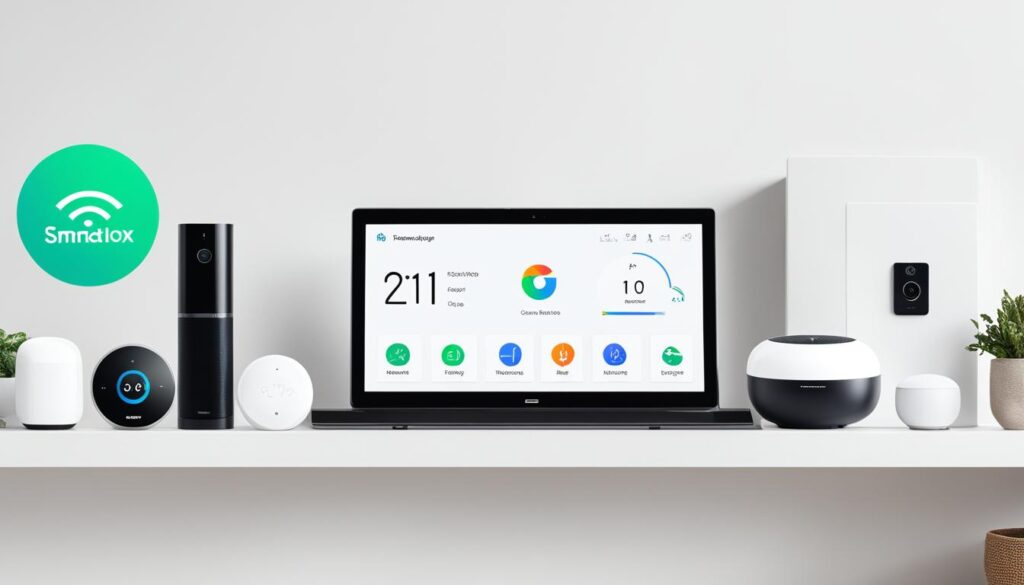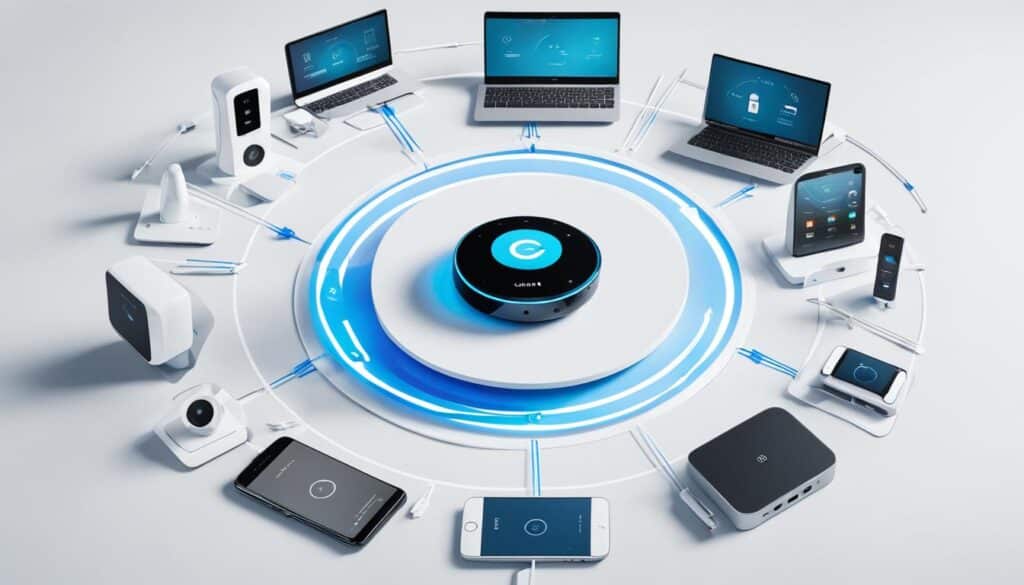Are you a beginner in the world of smart home technology? Don’t worry, I’ve got you covered! Navigating the complexities of smart home device compatibility can be overwhelming at first, but with a few essential tips, you’ll be seamlessly integrating smart devices into your home in no time.
Table of Contents
Key Takeaways:
- Understand the concept of a smart home ecosystem and how devices work together.
- Research and ensure compatibility between your smart home devices.
- Consider choosing devices from the same brand or platform for easier integration.
- Utilize compatibility tools and resources available online.
- Consult with smart home professionals for personalized guidance.
Understand Your Smart Home Ecosystem
Before delving into the world of smart home devices, it’s essential to grasp the concept of a smart home ecosystem. A smart home ecosystem refers to the interconnected network of devices that work together to automate and control various aspects of your home. These devices encompass a wide range of products, including smart hubs, voice assistants, smart lights, thermostats, security cameras, and more.
Choosing the right devices for your smart home ecosystem is crucial to ensure seamless integration and optimal performance. Compatibility between devices is key, as it allows them to communicate effectively and work together harmoniously.
“A smart home ecosystem is like a symphony, where each device plays its part, contributing to the overall orchestration of your home.”
Imagine being able to control your lights, adjust your thermostat, and monitor your security cameras all from one central hub. That’s the power and convenience that a well-designed smart home ecosystem can bring.
When considering which devices to incorporate into your ecosystem, think about the tasks and functionalities that are most important to you. Whether it’s enhancing security, improving energy efficiency, or creating personalized lighting scenes, there’s a smart home device out there to fulfill your needs.
In the next section, we’ll delve into the importance of researching device compatibility to ensure a smooth and hassle-free smart home experience.
| Benefits of Understanding Your Smart Home Ecosystem | Benefits of Ensuring Compatibility |
|---|---|
|
|
Understanding the intricacies of your smart home ecosystem will set the foundation for building a seamless and efficient network of devices. So, let’s dive deeper into researching device compatibility to ensure a smooth integration process.
Exploring Smart Home Automation Trends
As you embark on your journey to build a compatible smart home ecosystem, it’s essential to stay informed about the latest trends in smart home automation. Understanding these trends can help you make more informed decisions about your smart home setup and prepare you for future advancements in technology. Here are some key trends to consider:
1. Increased Interoperability
The push for increased interoperability among smart home devices is becoming a significant trend. Companies are now working together to create devices that can communicate seamlessly across different platforms. The introduction of standards such as Matter, a unified connectivity standard, aims to enhance the compatibility between various smart home devices, making it easier for consumers to mix and match products from different manufacturers without compatibility concerns.
2. Enhanced Security Features
With the rise of smart home technology, security has become a top priority for many consumers. New devices now come equipped with advanced security features, including AI-driven monitoring systems, facial recognition, and end-to-end encryption. As smart home security technology evolves, homeowners can expect to see more integrated solutions that not only protect their homes but also provide valuable insights and analytics regarding their home security status.
3. Voice Control and AI Integration
Voice control continues to be a game-changer in the realm of smart home automation. With the increasing integration of artificial intelligence (AI), smart devices can learn user preferences and automate actions based on individual behaviors. For example, your smart assistant may recognize your daily routine and adjust your home environment accordingly, creating a more personalized living experience. This trend emphasizes the importance of selecting devices that offer advanced voice control features.
4. Focus on Sustainability
Sustainability is increasingly influencing consumer choices in smart home technology. Many manufacturers are producing energy-efficient devices that not only reduce energy consumption but also provide insights into energy usage. Smart thermostats, for example, can analyze your heating and cooling patterns to optimize energy efficiency, ultimately lowering your utility bills while reducing your carbon footprint. As environmental awareness grows, expect to see a wider range of eco-friendly smart home products available in the market.
5. Integration of Health and Wellness Features
The integration of health and wellness features into smart home technology is a growing trend. From air quality monitors to smart sleep trackers, devices are now designed to enhance your well-being. For instance, smart air purifiers can automatically adjust their settings based on real-time air quality data, while smart lighting systems can mimic natural daylight to improve your sleep cycle. These advancements make it easier for homeowners to create a healthy living environment tailored to their individual needs.
Research Device Compatibility
When it comes to selecting smart home devices, research is key to ensuring compatibility with your existing smart home ecosystem. Each device has its own specific requirements, such as the operating system, communication protocol, or integration with popular smart home platforms like Amazon Alexa or Google Assistant. Take the time to read through product specifications and reviews to ensure compatibility and avoid any potential issues.
Some of the factors to consider when researching device compatibility are:
- Operating System Compatibility: Check if the device is compatible with the operating system of your smart home ecosystem, whether it’s iOS, Android, or another platform.
- Communication Protocol: Determine the communication protocol supported by the device. Common protocols include Wi-Fi, Zigbee, and Z-Wave.
- Smart Home Platform Integration: Verify if the device seamlessly integrates with popular smart home platforms like Amazon Alexa, Google Assistant, or Apple HomeKit.
By conducting thorough research, you can ensure that the smart home devices you select are compatible with your existing ecosystem, avoiding any compatibility issues or limitations.
“Research is vital when it comes to selecting smart home devices. It allows me to make informed decisions and ensure compatibility with my existing smart home ecosystem.” – SmartHomeEnthusiast—User on SmartHomeForum
Comparative Features of Smart Home Devices
| Smart Home Device | Operating System Compatibility | Communication Protocol | Smart Home Platform Integration |
|---|---|---|---|
| Brand A Smart Light Bulb | iOS, Android | Wi-Fi | Amazon Alexa, Google Assistant |
| Brand B Smart Thermostat | Android, Apple HomeKit | Zigbee | Apple HomeKit |
| Brand C Smart Security Camera | iOS, Android | Wi-Fi, Zigbee | Amazon Alexa, Google Assistant, Apple HomeKit |
Choose Devices from the Same Brand or Platform
To simplify the compatibility process, I recommend choosing smart home devices from the same brand or platform. Many manufacturers offer a wide range of devices that are specifically designed to work seamlessly together, ensuring a hassle-free setup and integration.
When you opt for devices from the same brand or platform, you can take advantage of the pre-established compatibility and interoperability between them. This means that you can effortlessly connect and control multiple devices through a single app or voice assistant, without the need for additional complicated configurations.
For instance, if you select smart lights, thermostats, and security cameras all from the same brand, these devices are likely to communicate with each other seamlessly, enhancing the overall performance and functionality of your smart home ecosystem.
Ease of Use and Convenience
Choosing devices from the same brand or platform not only simplifies compatibility but also offers a seamless user experience. By relying on a single app or voice assistant, you can easily manage and control all your compatible devices through a unified interface.
This streamlined approach eliminates the need to juggle multiple apps or voice commands for different devices, making your smart home setup more user-friendly and convenient. Whether you want to adjust the lighting, set the temperature, or monitor your security cameras, you can do it all from a single control point.
Enhanced Device Integration
Devices from the same brand or platform are often designed to complement each other, allowing for enhanced integration and advanced features. These devices are optimized to work together seamlessly, leveraging each other’s capabilities for a more comprehensive smart home experience.
When you choose devices from the same brand or platform, you can unlock powerful integrations that go beyond basic functionality. For example, a smart thermostat from the same brand as your smart lighting system can collaborate to create energy-saving scenarios, automatically adjusting the temperature when the lights are turned off.
This level of integration not only enhances convenience but also provides more sophisticated automation possibilities, allowing you to create personalized routines and scenes tailored to your specific needs.

By carefully selecting devices from the same brand or platform, you can ensure optimal compatibility, seamless integration, and a cohesive smart home experience. Whether you’re starting from scratch or expanding your existing setup, this approach simplifies the process and enhances the overall functionality of your smart home ecosystem.
Utilize Compatibility Tools and Resources
When it comes to selecting compatible smart home devices, the process can sometimes feel overwhelming. However, there are various compatibility tools and resources available that can make this task much easier. By utilizing these tools and resources, you can ensure that the devices you choose will seamlessly integrate into your smart home ecosystem.
Online Communities and Forums
One valuable resource to consider is online communities and forums dedicated to smart home technology. These platforms often provide guidance, recommendations, and user experiences with different smart home devices. By joining these communities, you can gain valuable insights and knowledge from fellow smart homeowners and experts.
Manufacturer Websites
Many device manufacturers have dedicated websites that provide comprehensive information on compatibility requirements and recommendations. These websites often offer compatibility checkers or compatibility lists that can help you determine which devices will work together seamlessly. Take the time to explore these resources to make informed decisions and avoid any compatibility issues.
Smart Home Platforms
Smart home platforms like Amazon Alexa, Google Assistant, and Apple HomeKit also offer resources for device compatibility. These platforms typically provide compatibility lists that specify which devices are compatible with their respective ecosystems. By referring to these lists, you can ensure that the devices you choose are compatible with the platform you intend to use.
Compatibility Checkers
Some manufacturers and smart home platforms offer compatibility checkers that allow you to input the devices you already own or plan to purchase. These tools will then analyze the compatibility and provide you with a clear indication of whether the devices will work together seamlessly. Consider using these checkers to save time and avoid any potential compatibility issues.
| Resource | Description |
|---|---|
| Online Communities and Forums | Platforms where smart home enthusiasts share insights and recommendations for compatible devices based on their experiences. |
| Manufacturer Websites | Websites of device manufacturers that provide comprehensive compatibility information, including compatibility checkers and lists. |
| Smart Home Platforms | Platforms like Amazon Alexa, Google Assistant, and Apple HomeKit that offer compatibility lists for devices that work within their ecosystems. |
| Compatibility Checkers | Tools provided by manufacturers and smart home platforms to assess the compatibility of devices before purchasing or integrating them into your smart home ecosystem. |
By utilizing these compatibility tools and resources, you can navigate the world of smart home device compatibility with confidence. Take advantage of online communities, manufacturer websites, smart home platforms, and compatibility checkers to ensure a seamless integration of your smart home devices.

Consult with Smart Home Professionals
If you find yourself unsure about which smart home devices are compatible or need assistance with setting up your smart home ecosystem, it’s always a good idea to consult with smart home professionals. These experts have in-depth knowledge and experience with smart home technology, and they can provide personalized recommendations based on your specific needs and requirements.
Smart home professionals can help you navigate the complexities of device compatibility and ensure that you make informed decisions when selecting smart home devices. Whether you’re just starting out or looking to expand your existing smart home setup, their expertise can be invaluable.
By consulting with smart home professionals, you can receive guidance on which devices are compatible with your existing smart home ecosystem. They can help you understand the technical specifications, communication protocols, and compatibility requirements of different devices, ensuring a seamless integration process.
“Smart home professionals can provide personalized recommendations based on your specific needs and requirements, helping you make informed decisions when selecting smart home devices.”
Furthermore, smart home professionals are well-versed in the latest trends and advancements in the industry. They stay up-to-date with new product releases and developments, so they can advise you on the best options available based on your preferences and budget.
Whether you need assistance with device installation, troubleshooting, or optimizing your smart home ecosystem, smart home professionals can offer guidance and support every step of the way. They can help you maximize the potential of your smart home devices and ensure a seamless and enjoyable smart home experience.
Benefits of Consulting with Smart Home Professionals
There are several benefits to consulting with smart home professionals:
- Expertise: Smart home professionals have a deep understanding and knowledge of smart home technology, ensuring that you receive accurate and reliable information.
- Personalized Recommendations: They can provide tailored recommendations based on your unique requirements and preferences, helping you choose the right devices for your smart home ecosystem.
- Troubleshooting Assistance: If you encounter any issues or difficulties with your smart home devices, smart home professionals can help troubleshoot and resolve the problem quickly and efficiently.
- Optimal Performance: By consulting with professionals, you can ensure that your smart home devices are set up and configured correctly, maximizing their performance and functionality.
- Future-Proofing: Smart home professionals can advise you on future-proofing your smart home ecosystem, recommending devices that are compatible with emerging technologies and standards.
Consulting with smart home professionals offers peace of mind and ensures that you make informed decisions when it comes to device compatibility and integration. Their expertise can save you time, effort, and potential frustration throughout the setup and management process.
Comparison of Smart Home Consulting Services
| Service Provider | Expertise Level | Consultation Fee | Availability |
|---|---|---|---|
| Smart Homes Inc. | High | $100 per hour | By appointment |
| Intelligent Living Solutions | Medium | $75 per hour | Flexible hours |
| Tech Savvy Homes | Low | $50 per hour | 24/7 availability |
Note: The prices and availability mentioned in the table above are for illustrative purposes only and may vary.
When in doubt or seeking professional advice, reach out to smart home professionals who can guide you through the process of choosing compatible devices and setting up your smart home ecosystem. Their knowledge and expertise can make a significant difference, ensuring that you enjoy the full benefits of a seamlessly integrated smart home.
Conclusion
In conclusion, achieving smart home device compatibility as a beginner can be a straightforward process if you follow these essential tips. Firstly, it is crucial to understand your smart home ecosystem and how devices work together to automate and control your home. This knowledge will help you make informed choices when selecting devices.
Next, take the time to research device compatibility. Read product specifications and reviews to ensure that the devices you choose are compatible with your existing smart home ecosystem. This step will prevent any potential issues and ensure seamless integration.
Consider choosing devices from the same brand or platform. Many manufacturers offer a range of devices that are designed to work together, making setup and integration easier. Using a single brand or platform also simplifies the control and management of your smart home ecosystem.
Additionally, make use of compatibility tools and resources available. Websites, forums, and online communities dedicated to smart home technology are great sources of guidance and recommendations. Manufacturers and smart home platforms also provide compatibility checkers or lists to help you make the right choices.
Lastly, if you still need assistance, don’t hesitate to consult with smart home professionals. These experts can provide personalized recommendations and support based on your specific needs and requirements.
Embrace the convenience, efficiency, and security that smart home technology offers while ensuring optimal compatibility between your devices. With these tips and guidance, you can seamlessly integrate smart home devices into your home and enjoy the benefits they bring.
FAQ
What is a smart home ecosystem?
A smart home ecosystem refers to the interconnected network of devices that work together to automate and control various aspects of your home. This can include devices such as smart hubs, voice assistants, smart lights, thermostats, security cameras, and more.
How do I ensure compatibility with my existing smart home ecosystem?
When selecting smart home devices, it is important to research and ensure compatibility with your existing smart home ecosystem. This can involve checking compatibility requirements such as the operating system, communication protocol (e.g., Wi-Fi, Zigbee, Z-Wave), or integration with popular smart home platforms like Amazon Alexa or Google Assistant.
Should I choose smart home devices from the same brand or platform?
Yes, it is often beneficial to choose smart home devices from the same brand or platform. This can ensure seamless integration and easy setup, as many manufacturers offer a range of devices that are designed to work together. It can also simplify control and management as you can use a single app or voice assistant to control multiple devices.
Are there any compatibility tools and resources available to help me?
Yes, there are various compatibility tools and resources available to help you with selecting compatible smart home devices. Websites, forums, and online communities dedicated to smart home technology often provide guidance and recommendations. Additionally, many manufacturers and smart home platforms offer compatibility checkers or compatibility lists.
What if I need assistance with setting up my smart home ecosystem?
If you need assistance with setting up your smart home ecosystem, consider consulting with smart home professionals. These experts have in-depth knowledge and experience with smart home technology and can provide personalized recommendations based on your specific needs and requirements.


